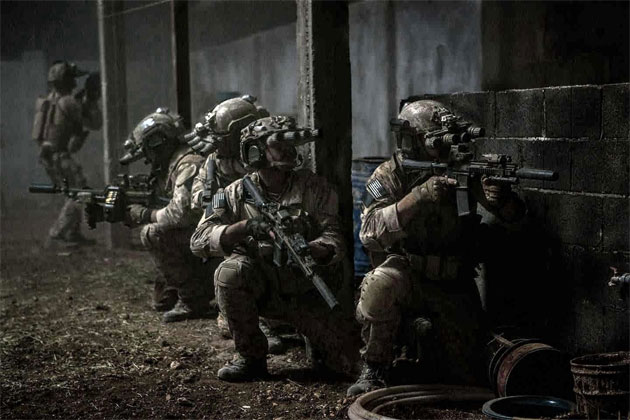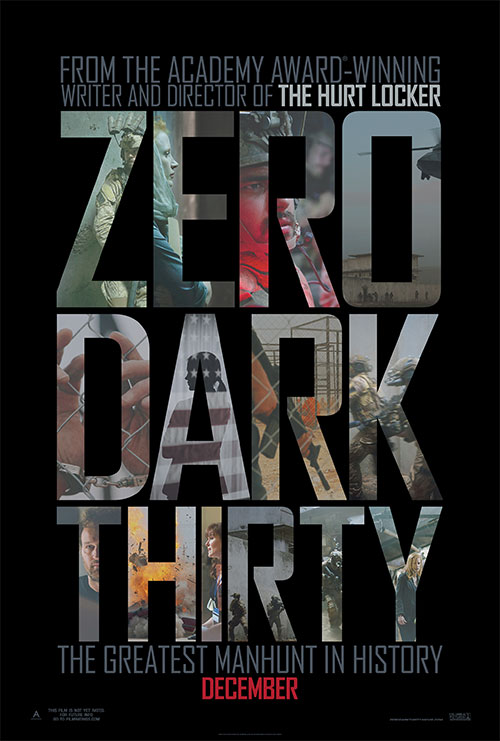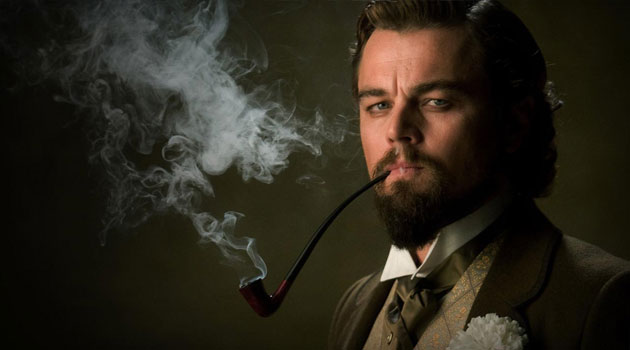Director: Kathryn Bigelow
Writer: Mark Boal
Cast: Jessica Chastain, Joel Edgerton, Chris Pratt
Zero Dark Thirty, the cinematic dramatization of the manhunt to kill Osama Bin Laden, is a film that comes laden with baggage. Prior to the film’s release, there was a lot of negative press drawn towards Kathryn Bigelow’s film, its portrayal of torture and whether it wrongfully implied that the use of waterboarding lead to the critical information that identified Bin Laden’s whereabouts.
Having seen the film firsthand, I’m a little unsure if those critics interpreted the film correctly or if they saw it all. There is a strong focus on the torturing of detainees in the opening act of the film, but the information is largely unuseful. It is only when a high ranking captive bluffs too hard in an exchange about the knowledge of Bin Laden’s courier Abu Hamed, does the investigation gather any real traction.
The real eye-opening thing about this film to me is that it feels categorically the opposite to what I was lead to believe it was. To my eyes, this is a film that is bereft of military jingoism and propaganda. Instead the CIA operatives are made to look cold, calculating and frighteningly casual in their disregard for human rights as they track down ‘UBL’.
Jessica Chastain plays Maya, a CIA operative who joins the investigation in 2003. She befriends another operative named Dan, played by Jason Clarke, who spends his days torturing a man named Ammar in an undisclosed location.
Are we supposed to sympathise with Maya and Dan? I’m not so sure. Dan is already emotionally hardened and morally bankrupt. He views Abu Ghraib and Gitmo as inconveniences and gives the following advise to Maya: “don’t be the one left holding a dog collar when the oversight committee comes.” He clearly views torture as dirty but necessary work but I don’t think that means Kathryn Bigelow expects the audience to agree.
Maya herself is defined almost entirely by her work. Friendless and devoid of any hobbies or humour, she has this particular exchange with a CIA leader late in the film:
“Have you done anything else noteworthy in the CIA?”
“No. I was recruited out of highschool and all I’ve done is investigate Bin Laden”
And that’s her in a nutshell. So single minded in her work is Maya that when she is caught in a hotel bombing in Pakistan, she emerges unscathed but then strolls out of the building completely ignoring the people who are hurt around her and in need of help. Get Bin Laden is the prime directive.
The search for Bin Laden is messy, tiresome work and by the middle of the decade, most high ranking officials have lost hope and run through the motions. From no higher a source than George Bush: “I don’t care where Bin Laden is.” Maya, however, retains a steely resolve to track down the man.
If Zero Dark Thirty is to be believed, the key to tracking down Bin Laden was not the years of torture and interrogation, but some deft supposition and Agatha Christie-esque detective work that relied on nary a shred of hard evidence.
Maya identifies the name Abu Ahmed as a man who is consistently known to low ranking Al Qaeda captives but no one knows his whereabouts or what he does. Maya supposes that this makes him Osama’s right hand man and courier and she believes her theory is correct when a high ranking captive denies all knowledge of his existence.
Through the use of bribery and some low tech police work (literally driving in a circle in a Pakistani village looking for a man on a phone), she finds Abu Ahmed and tracks down Bin Laden’s hideout in Abottabad.
From here, the film shifts gears and closes with a final act that shows the SEAL raid on the compound. After the first two acts which bounce between torture scenes and idle deskwork, the last act is a pulse pounding thriller. Bigelow shows her action movie chops here as she recreates the shootout in a thirty minute sequence where, despite knowing the ultimate outcome, succeeds in being tense and nerve wracking.
Kathryn Bigelow has made a dark, unsavoury and challenging film here. It seems to have repulsed people on either side of the political aisle. She doesn’t shy away for a second from portraying the CIA and the SEALs for who they are or what they do. And you know what? Thats probably the best type of film that Bin Laden, 9/11 and the whole bloody Afghan invasion deserves.
Consider the SEAL operation in the compound. After gunning down the men and sparing the women and children, a soldier enters the third floor and is ambushed by an assailant. The soldier kills the man and then shoots dead a woman who begins wailing and smothering the body. Should the soldier have shot the woman? Was she an innocent bystander or was she reaching for his gun? We barely have time to register what happens before the scene moves on. This is a film with an unflinching lens that stares at the shades of grey of military combat and provokes a reaction from the viewer.
Zero Dark Thirty is an apt name for the film. It is military-speak for half past midnight but it also sums up the tone of the film. In the film’s closing scene, Maya sits alone on a plane, shedding tears. They don’t seem to be happy tears, no genuine satisfaction of a longstanding mission finally over. There is a sense instead that her chance of living a normal life after this is practically nil.
In the real world, I recently read about the SEAL who shot and killed Bin Laden. He is struggling to adjust to civilian life, he has no pension, a crumbling marriage and inadequate healthcare. War is a dirty business and ultimately, I believe thats at the heart of what Kathryn Bigelow has to say.
Review Overview
Rating
Good
Summary : Its complex, divisive and delves into a morally grey area about the War on Terror. Bigelow's film is open to interpretation and doesn't offer any easy answers. Which I think is exactly how a film of this nature should be.
 The FAT Website est. 1999
The FAT Website est. 1999





